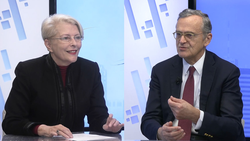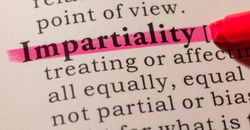March 16, 2024
Interviews

► Référence complète : R.-O. Maistre, "La place du Droit de la compliance dans la régulation de l’espace numérique", entretien mené par M.-A. Frison-Roche à l'occasion d'une série d'entretiens sur le Droit de la Compliance, in Fenêtres ouvertes sur la gestion, émission de J.-Ph. Denis, Xerfi Canal, enregistré le 12 décembre 2023, diffusé le 16 mars 2024
____
🌐consulter sur LinkedIn la présentation en décembre 2023 de l'entretien avec Roch-Olivier Maistre
____
____
🎥visionner l'interview complète sur Xerfi Canal
____
► Point de départ : En 2022, Roch-Olivier Maistre écrit une contribution sur 📝Quels buts fondamentaux pour le régulateur dans un paysage audiovisuel et numérique en pleine mutation ?, dans 📕Les Buts Monumentaux de la Compliance.
🧱lire la présentation de cette contribution ➡️cliquerICI
____
► Résumé de l'entretien :
Marie-Anne Frison-Roche : Question : L’Arcom a un rôle central en matière de Compliance. Pourriez-vous nous présenter cette Autorité de régulation qu’est l’Arcom ?
Roch-Olivier Maistre : Réponse : le Président Roch-Olivier Maistre décrit le rôle de l'Arcom, autorité qui résulte du CSA et de l'Hadopi, le législateur décidant de créer un nouveau grand Régulateur en charge à la fois de l'audiovisuel et du numérique. Cette Autorité collégiale s'assure du bon fonctionnement de ce secteur et est engagée dans la régulation des nouveaux acteurs du numérique.
____
MaFR : Q. : Comment Régulation et Compliance s’articulent-elles dans la mise en œuvre des missions de l’Arcom ?
R.O.M. : R. : Il répond qu'il s'agit d'une approche complémentaire. Coercition, sanctions s'y articulent. Il s'agit de préserver la liberté d'expression et de communication. Pour cela, objectifs de valeur constitutionnelle, les opérateurs doivent agir pour que ces objectifs soient atteints. Pour cela, ils sont supervisés par l'Autorité qu'est l'Arcom, qui intervient qu'ils ne se conforment à ces obligations de compliance. Lorsqu'il ne s'agit pas de l'audiovisuel, où le contenu est encore possible car il s'agit d'un "monde fini", mais qu'il s'agit du monde numérique, où les contenus se répandent d'une façon virale, c'est aux opérateurs d'agir : la Régulation et la Compliance agissent donc d'une façon complémentaire.
________
Updated: March 15, 2023 (Initial publication: Sept. 16, 2021)
Thesaurus : Doctrine

► Full Reference: R.-O. Maistre, "What monumental goals for the Regulator in a rapidly changing audiovisual and digital landscape?", in M.-A Frison-Roche (ed.), Compliance Monumental Goals, series "Compliance & Regulation", Journal of Regulation & Compliance (JoRC) and Bruylant, 2023, p.
___
► Article Summary (done by the JoRC editor): In France, since the law of 1982 which put an end to the State monopoly on the audio-visual area, the landscape has profoundly evolved and diversified. In view of the multitude of players who are now established there, the Conseil supérieur de l'audiovisuel - CSA (French High Audiovisual Council) must ensure the economic balance of the sector and the respect for pluralism, in the interest of all audiences. The growing societal responsibilities of audiovisual media and new digital players have multiplied the "monumental goals" on which the Arcom is watching.
Its competences have gradually been extended to the digital space and the successive laws concerning its missions aim at new objectives, in particular in terms of protection of minors, fight against online hate or against disinformation. The emergence of a new European model of Regulation makes it possible to give substance to these additional goals, the Regulator adopting a systemic perspective and calling on soft law tools to fulfill its new missions.
____
________
July 17, 2022
Compliance: at the moment

Sept. 9, 2020
Newsletter MAFR - Law, Compliance, Regulation

Full reference: Frison-Roche, M.-A., Freedom&Media: when Italian Media Regulation's real "goal" is not Pluralism Protection, Freedom of Establishment prevails (CJEU, 3 Sept.2020,Vivendi), Newsletter MAFR - Law, Regulation, Compliance, 9th of September 2020
Read by freely subscribing other news of the Newsletter MAFR - Law, Regulation, Compliance
Summary of the news
The media sector is organized on an equilibrium between the principle of competition and other concerns like information pluralism. Generally, competition Law by making market accessible to many competitors ensures information pluralism. But, this is not the case if an operator get an excessive market power, running risk not only for competition but also for information pluralism. It is the reason why the Italian legal system forbids the constitution of an operator gathering more than 40% of the total income generated by the media sector or more than 10% of the total income generated by the Italian communication sector.
In 2016, Vivendi, a French media group, got more than 28% of the Mediaset Group's actions and around 30% of its voting right. The Italian communication regulation authority sized by Mediaset demands in 2017 to Vivendi to ends its participations in the group Mediaset. Vivendi contested this decision before the regional administrative court which referred to the Court of Justice of the European Union in order to know if freedom of establishment can legitimately be discarded in favor of information pluralism in this concrete case. The Court of Justice answered, in a decision of 3rd of September 2020, that the restriction of the freedom of establishment can in principle be justified by a general interest objective such as information pluralism protection but that in this concrete case, this is not justified because the fact that a firm is committed in the transmission of contents does not necessarily give it the power to control the production of such contents.
We can learn three lessons form this case:
- The Court precises that even if the principle is the freedom of establishment, it is possible to discard it to protect information pluralism protection under the condition that the concerned member State do not use this legitimate power to create a political monopoly, the burden of proof falling on the person attacking national legislation and not on the Member State.
- The Court distinguishes transmission of contents and production of contents and explains that if the State rejects this decision, the burden falling to it to prove the concrete links between these two activities.
- This case shows that the power to share the respective places of the "principle" and of the "exception" always comes back to the judges.
Aug. 19, 2020
Newsletter MAFR - Law, Compliance, Regulation

Full reference: Frison-Roche, M.-A., Regulators' Impartiality and contents control: "Les infidèles" case, Newsletter MAFR - Law, Compliance, Regulation, 19th of August 2020
Read by freely subscribing the other news of the Newsletter MAFR - Law, Compliance, Regulation
To go further, read the chapter of the book Compliance Tools: "The geographical pregnancy of Compliance tools" opened by an introductive chapter written by Jean-Baptiste Racine
Summary of the news
Impartiality of the regulator is one of the most important principles of Regulation and Compliance Law. However, this impartiality can be difficult to implement when the regulation object has a strong moral dimension.
In August 2020, various religious associations sized the Conseil National de Régulation de l'Audiovisuel sénégalais (Senegalese audiovisual regulatory authority) to ask the interdiction of broadcasting on television of the film "Les infidèles" telling the story of a married woman with multiple lovers.
First, the regulator distinguishes the sequences likely to be detrimental to cultural and religious identities and shocking sequences or likely to attack the dignity of the person. Then, it asks the deletion of indecent and obscene scenes and of scenes likely to be detrimental to cultural and religious identities, bans the broadcasting of the film in the television before 10.30 pm, asks an update of the trailer and requires the introduction of a pictogram "forbidden to children under 16" during the broadcasting. The CNRA judges itself able to regulate the content of telefilms in order to protect cultural identities with regards to the law of 4th of January setting its mission.
In 2012, a similar controversy surrounded, in France, the broadcasting of a different film with the same name. However, the purpose and the context were very different because the film was broadcasted at cinema, because it presented adultery men, because it was comic, because the competent regulator was not an administrative body but a professional body and because the broadcasting country was not the same. Here, only the poster was modified.
Thus, an impartial regulation must however taking into consideration "local cultural identities".
July 28, 1989
Thesaurus : 01. Conseil constitutionnel
Full reference: Conseil constitutionnel (French Constitutionnel Court), 26th of July 1989, Loi modifiant la loi n° 86-1067 du 30 septembre 1986 relative à la liberté de communication (law modifying the law of 1986 about freedom of communication), Decision n°89-259 DC